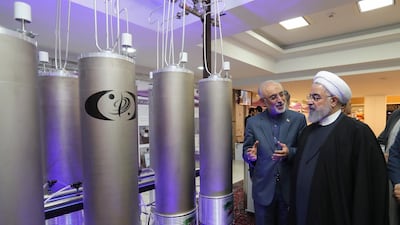Yesterday, Iranian President Hassan Rouhani announced that he would pull out of parts of the flawed Iran nuclear deal, and gave the remaining signatories 60 days to return to the negotiating table. The accord, signed in 2015, rewarded Tehran for decades of aggression and interference in the region. While European powers saw the deal as a basis for broader engagement with Tehran, the regime viewed it as a narrow agreement to temporarily pause its nuclear programme and continued with its nefarious activities in the region. From the Houthis in Yemen to Hezbollah in Lebanon, the regime's proxies continued to sow discord across the Middle East, bringing strife to its people. Meanwhile, Tehran continued its ballistic missile programme, despite UN resolutions prohibiting missile development. That is why the US, under President Donald Trump, withdrew from the nuclear deal last June – a move that was welcomed in this part of the region. Many European nations remain committed to the accord. But as The National reported, Europe now stands ready to join the US in imposing sanctions, should Tehran follow through on Mr Rouhani's threat. If such action is taken by Europe it will be long overdue.
This is a significant escalation in tensions between Iran and the US. The day before, US Secretary of State Mike Pompeo flew to Iraq, where he spoke of “specific and credible” intelligence that Iranian forces and proxies were targeting US forces across the region. Iran has also threatened to block the vital Strait of Hormuz. Tehran’s posturing, although dangerous, shows how weak its regime has become. It follows two significant US moves in April: firstly removing oil waivers for Iran’s main customers and secondly designating the Islamic Revolutionary Guard Corps a foreign terrorist group, a move without precedent. The tough US sanctions regime is clearly taking its toll on the Iranian economy. This is part of a concerted campaign of maximum pressure designed to compel Tehran to change its ways. The nuclear deal freed up billions of dollars for the Iranian regime. Rather than spending it on its people, for whom life has only become harder, it piled this money into foreign adventures in Iraq, Syria, Yemen and Lebanon.
Despite Iran’s many actions to destabilise the Middle East, European powers have fought to rescue the disastrous deal. In insisting on protecting a deal they negotiated, the Europeans in essence handed a life jacket to the Iranian regime. Meanwhile, Tehran has stepped up its international interference, even plotting assassinations in European nations, including France, the Netherlands and Denmark. Mr Rouhani’s statements yesterday demonstrate once again the reckless nature of the Iranian regime. The correct course of action is for all signatories to the deal to compel Iran to respect international law.

